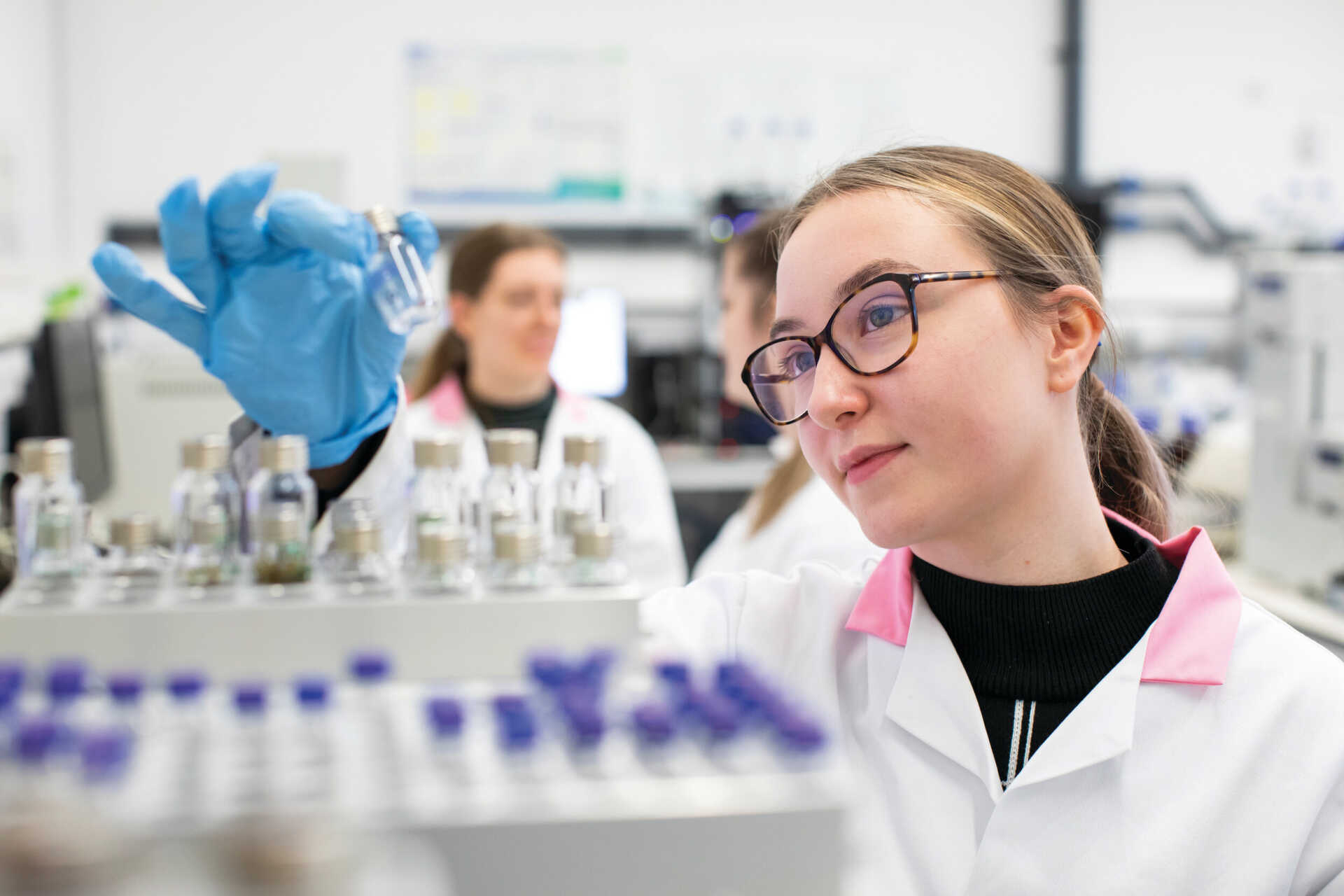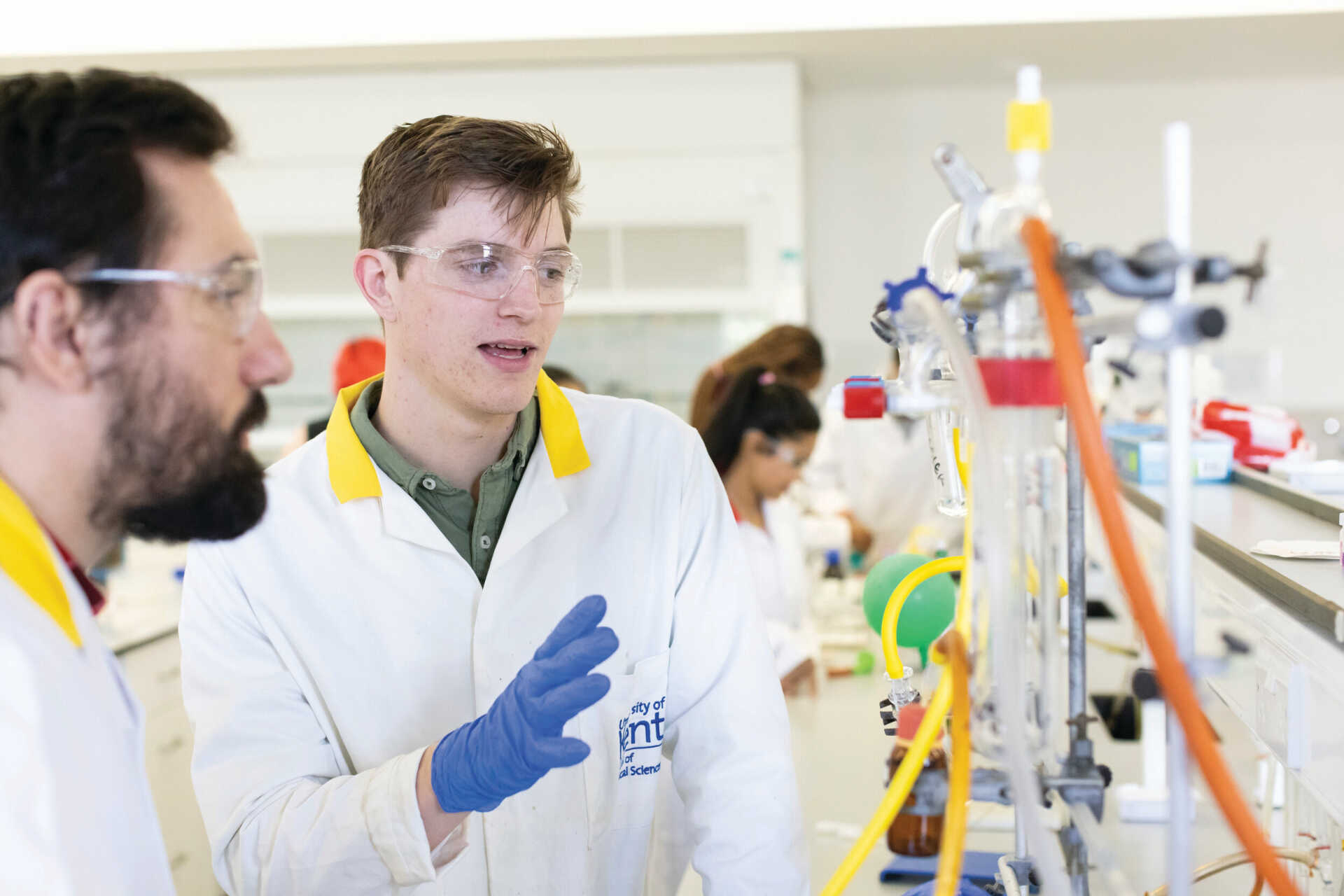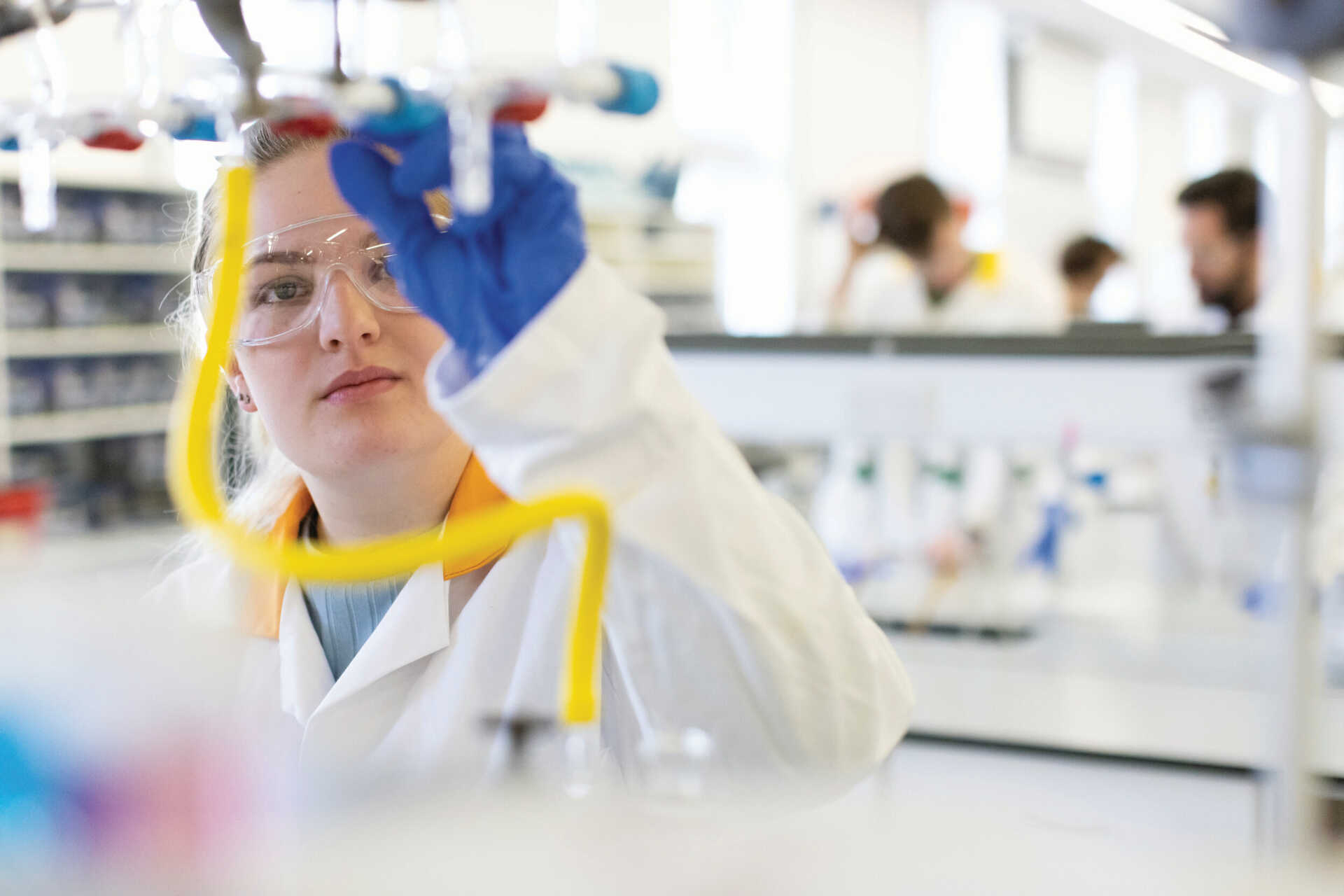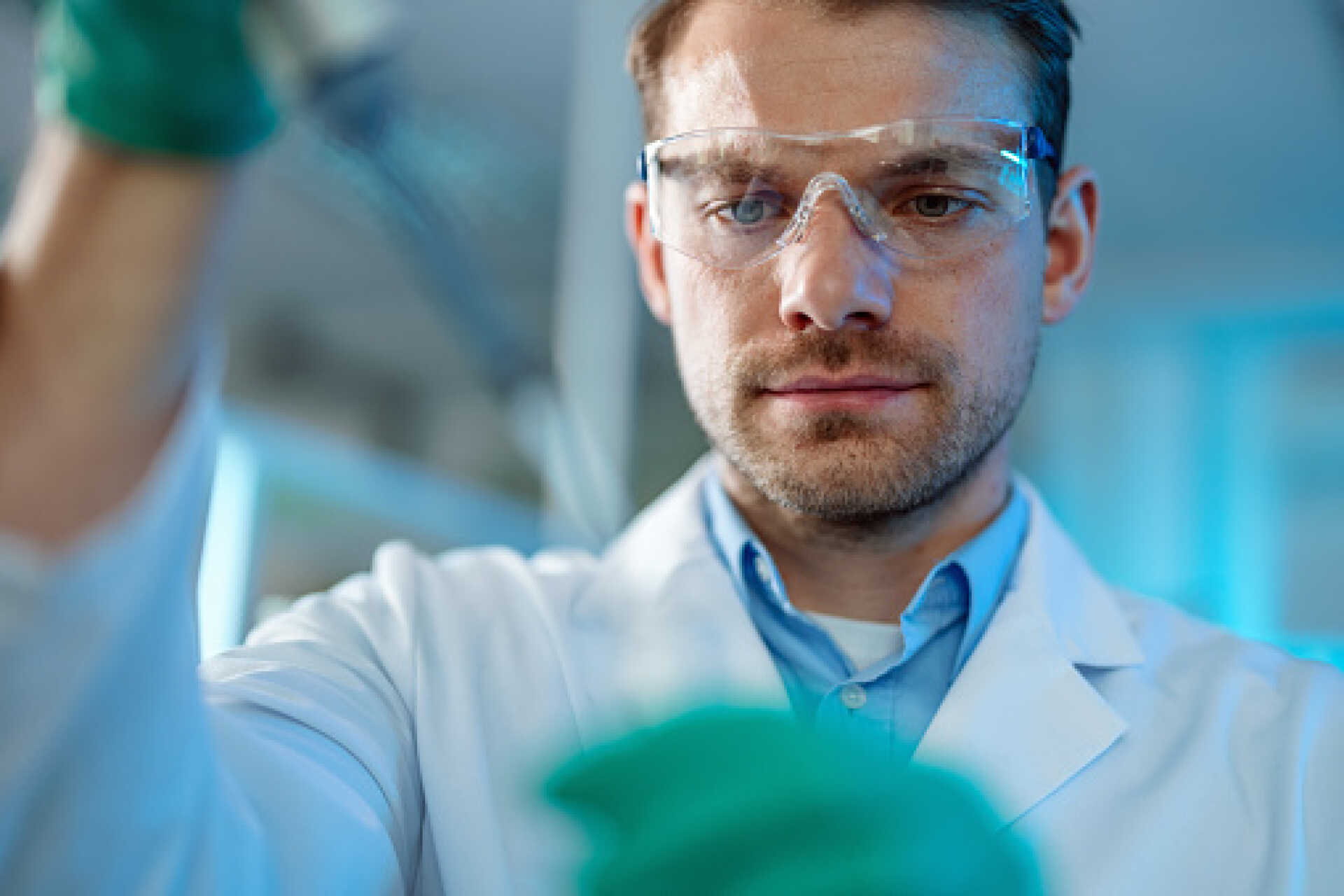Chemistry
with a Professional Placement
Choose chemistry to change the world and your future.

Choose chemistry to change the world and your future.
Interested in developing chemical compounds? Curious about the structure of chemicals and the reactions they have with one another? Enter the fascinating world of Chemistry at Kent to gain the knowledge and practical skills to help tackle the challenges of the 21st century. From combating climate change and creating energy storage devices, to developing new pharmaceuticals and cosmetics.
On your year in professional placement, you’ll work in industry for a year, gaining relevant work experience and putting into practice the skills you’ve learnt. The paid placement takes place between your second and final years and can be in the UK or abroad. You'll also produce an independent research project.
Our distinctive course includes a set of ‘chemistry in context’ modules where you can apply your knowledge to specific case studies - in our state-of-the-art facilities - as well as the opportunity to work with our leading research teams on your own project. You'll also benefit from our expert careers advice – we'll help you to achieve your ambitions.
This course is fully accredited by the Royal Society of Chemistry (RSC).

Your Chemistry degree opens the door to lots of exciting careers; taking a professional placement year helps you discover some of those options.
Study a wide range of modules from core chemistry concepts to how it can help build a better world with an introduction to chemistry and the environment.

Our lecturers are innovative teachers and active researchers: Professor Jennifer Hiscock is in a team that created a material that can stop supersonic impacts.
Spend a year studying abroad at one of our partner universities. We currently have links with institutions in the US, Canada, Hong Kong, Malaysia and Australia.

You'll use industry-standard equipment from the start of your degree.
Our typical offer levels are listed below and include indicative contextual offers. If you hold alternative qualifications just get in touch and we'll be glad to discuss these with you.
BBC including Chemistry, Biology or Physics at grade B
The University will consider applicants holding/studying BTEC Extended National Diploma Qualifications (QCF; NQF;OCR) in Applied Science at DMM.
112 Tariff points, Typically H5, H5, H6 at HL including HL Chemistry, Biology or Physics at 5
Mathematics grade C or 4
N/A
The University will consider applicants holding T level qualifications in subjects closely aligned to the course.
The University welcomes applications from Access to Higher Education Diploma candidates. for consideration. A typical offer may require you to obtain a proportion of Level 3 credits in relevant subjects at merit grade or above. A typical offer for stage 1 would be: Access to HE Diploma 45 at level 3 Credits with 18 credits at Distinction and 24 credits at Merit and contain at least 12 Level 3 credits in Chemistry. A science programme including Chemistry Level 3 credits would be required.
The following modules are offered to our current students. This listing is based on the current curriculum and may change year to year in response to new curriculum developments and innovation:
You’ll focus on the broad base on which chemistry is founded and start to build your practical lab skills.
Chemistry, as one of the physical sciences, is rooted in careful observation of the natural world and experimentation. This module teaches the key skills required to work in a chemical laboratory, analysing unknown systems and synthesising new ones, and learning how to apply the theories and ideas from lecture modules to socially and industrially relevant problems.
This module presents a unified understanding of the structure of matter, linking physical properties to bonding and energy, and providing the tools necessary to begin to describe and analyse chemical problems. Key concepts such as mass balance and bonding (ionic, covalent, metallic, and intermolecular) are linked to analytical methods to show how these fundamental ideas can be measured and used.
This module will provide an initial look into chemistry and the environment, introducing important concepts such as pollution and climate change. The effects of chemical disasters will also be considered. Additionally, this module will begin to provide students with the wider skills necessary to study chemistry at university.
An introduction to the core Mathematical skills required within the Chemical and Forensic Sciences. These core skills will be complemented with a variety of problem-solving applications in Chemistry and Forensic Science.
As scientific methods and instruments advance, computers become ever more important in data analysis and acquisition. This module introduces to the concept of programming languages and their uses, and presents a practically minded course on using simple programming to solve problems relevant to chemistry, and to automate the analysis and presentation of data.
Organic chemistry underpins not only much of the chemistry of living things but also modern materials, dyes, medicines, and more. This module discusses the structure of organic molecules in detail, showing the shape of molecules dictates their properties, and how Nuclear Magnetic Resonance spectroscopy (NMR) can exploit this to determine the structures and thus properties of unknown molecules. Fundamental modes of reactivity of organic molecules are discussed, showing how simple mechanisms can be used to build complex and useful compounds.
Inorganic chemistry considers the rich and varied chemistry of all the periodic table. This module shows how the variation in bonding across the periodic table leads to predictable and useful trends in structure and properties. The fundamental properties and reactivity of the transition metals are examined in detail to show how their magnetic and spectroscopic properties may by understood and exploited, laying the groundwork for future applications.
This module discusses the key ideas of thermodynamics and kinetics in a chemical context. It shows how the universe may be understood in terms of the flow of energy from high to low, and how this allows not only an understanding of what transformations are possible but also how fast they will occur. These essential physical principles are then applied to real world phenomena such as batteries, showing that even the most fundamental theories have direct and important applications in the modern world.
You’ll further develop your knowledge of organic, inorganic and physical chemistry and continue to develop your lab skills.
Chemistry, as one of the physical sciences, is rooted in careful observation of the natural world and experimentation. This module builds upon the key skills developed in the previous year, teaching new synthetic and analytical techniques, coupled with work using computational methods and analytical software to provide a deeper understanding of lecture material and how it may be applied more generally, and learning how to apply the theories and ideas from lecture modules to socially and industrially relevant problems.
This module will deepen your understanding of quantum mechanics and symmetry. We explore how this gives rise to quantisation and selection rules, and go on to apply this to spectroscopic methods to understand structure and bonding including: rotational (microwave) spectroscopy, vibrational (IR and Raman) spectroscopy and electronic transitions (UV-vis).
Underpinning both modern industrial catalysis and many biological systems, the chemistry of metal-carbon bonds is both incredibly important and diverse. This module delves into the factors controlling structure, bonding, and reactivity in organometallic species across the periodic table. It teaches how the properties of organometallic systems can be understood, controlled, and applied to solve important problems in the modern world.
This course will introduce students to the key ideas and fundamental molecular components of biochemistry. The course will cover simple biomolecules and non-covalent interactions, building up to biological oligomers. This will lead to introductory pharmacology and pharmacokinetics, illustrated with medicinal chemistry case studies.
Chemistry, as one of the physical sciences, is rooted in careful observation of the natural world and experimentation. This module builds upon the key skills developed in previous laboratory modules, working towards longer and open-ended experiments designed to prepare students for research projects in stage 3.
In this module, you will study organic reactions and compounds encountered in organic chemistry in depth. In particular, you will look at the organic chemical reaction mechanisms (including aspects of physical organic chemistry) and the reactions of a variety of organic compounds. You will also look at strategies for synthesising target molecules. Topics may include carbon-carbon bond formation, aromatic chemistry, the kinetics of organic chemistry, and carbonyl chemistry.
Analytical chemistry underpins all other aspects of the discipline, and covers not only how to find out what a thing is but how to design experiments and confirm results to quantify just how confident you can be that your answer is useful. This module takes a pragmatic, applications driven approach to sample preparation, analysis, and data validation.
The functional properties of solids, which are widely used for their ability to conduct electricity and ions, is determined by their structure on the atomic scale. An understanding of this is vital to the development of new materials, including those required to enable the clean energy technologies of tomorrow. This module will provide you with an understanding of the structures of solids and how they’re determined. We will also explore the properties of materials, including electronic and ionic conductivity, and the role solids play in energy-related technologies.
After successfully completing stage 1 at your first attempt, with an average pass mark of at least 60%, you have the opportunity to spend a year in industry between Stages 2 and 3. We give advice and guidance on finding a placement.
Please note that acceptance onto the course is not a guarantee of a placement. The responsibility of finding a placement is on the student, with help and support from the department. If you cannot find a placement, you will be required to change your registration for the equivalent BSc programme without the Year in Industry option.
Students spend a year (minimum 9 months) working in an industrial or commercial setting, applying and enhancing the skills and techniques they have developed and studied in the earlier stages of their degree programme. The work they do is entirely under the direction of their industrial supervisor, but support is provided via a dedicated Placement Support Officer within the School. This support includes ensuring that the work they are being expected to do is such that they can meet the learning outcomes of the module.
Students spend a year (minimum 9 months) working in an industrial or commercial setting, applying and enhancing the skills and techniques they have developed and studied in the earlier stages of their degree programme.
The report required for this module should provide evidence of the subject specific and generic learning outcomes, and of reflection by the student on them as an independent learner.
In your final year, alongside your modules, you complete an independent research project.
This module will provide students with the skills necessary to propose, develop, perform and report on a project. The emphasis on of this module will focus on not only academic projects but also on industrial requirements.
This module introduces key concepts and practises of supramolecular and polymer chemistry. It will focus on linking past modules to supramolecular chemistry and outline important concepts and examples of supramolecular chemistry. This will include non-covalent interactions, self-association and self-assembly with an overall emphasis on soft matter and solution-based supramolecular concepts. This module will also give an overview of fundamental concepts in polymer chemistry (synthesis, characterisation and properties) leading to a more specialised introduction to block copolymers, self-assembly and supramolecular polymer chemistry that will build upon previous course material.
In this module, you will study chirality; the ‘handedness’ of chemistry and how we can manipulate chemical bonds to produce enantiomerically pure molecules for the pharmaceutical and life sciences. You will also understand the formation of key medicinally relevant heterocyclic systems, and learn to logically plan a complex chemical synthesis. Topics include cycloaddition chemistry, heterocycle synthesis, asymmetric synthesis, retrosynthesis and radical chemistry.
Analytical chemistry underpins all other aspects of the discipline. This module discusses modern methods in data analysis and processing, Cheminformatics and “Big Data”, and describes advanced analytical methods used for analysing complex systems.
In this module students will undertake individual research projects. You will gain skills in conducting and directing scientific research, data analysis and interpretation, problem solving and communication of results, culminating in the writing of your dissertation.
Computational modelling and simulations are increasingly used in the natural sciences to complement experimental work and can be used to provide unique insight, especially when experiments are expensive, dangerous or prohibited. Here, we will introduce students to modelling and simulation approaches that a chemistry practitioner is likely to encounter in their career. Possible topics may include mesoscale modelling, classical mechanics, quantum mechanics and machine learning.
The electronic structure and bonding of inorganic systems is directly responsible for their physical properties and reactivity, and leads to the diverse spectroscopic and magnetic properties observed and exploited in the modern world, as well as dictating their stability. This module looks at the factors controlling these properties in small molecules and clusters, how they may be measured, and builds a fundamental understanding off these systems with a focus on understanding and solving a range of contemporary problems.
This module will introduce you to methods for preparing and characterising solids such as crystalline, nano- and amorphous materials. The module will also explore properties such as magnetism, dielectric and electronic behaviours which depend on the symmetry and structure of condensed matter phases.
The degree is made of a combination of lectures, laboratory classes, project work and problem solving seminars.
Assessment is by a combination of written examinations, continuous assessment and other assignments. You must pass the Stage 1 examinations in order to go on to Stage 2. The year in industry mark also counts towards your final degree result.
Coursework assessments include practical laboratory skills, presentation skills as well as essay and report writing.
Please note that there are degree thresholds at stage 1 that you will be required to pass in order to continue onto the next stages.
For a student studying full time, each academic year of the programme will comprise 1200 learning hours which include both direct contact hours and private study hours. The precise breakdown of hours will be subject dependent and will vary according to modules.
Methods of assessment will vary according to subject specialism and individual modules.
Please refer to the individual module details under Course Structure.
The programme aims to:
You gain knowledge and understanding of:
You gain the following intellectual abilities:
You gain subject-specific skills in the following:
You gain transferable skills in the following:
You'll graduate with an excellent grounding in scientific knowledge and extensive laboratory experience, as well as a toolbox of transferable skills highly sought after by employers. These include excellent communication and problem-solving skills; the ability to work independently or as part of a team; analytical thinking; and effective time management. Typical graduate destinations include:

The 2024/25 annual tuition fees for this course are:
For details of when and how to pay fees and charges, please see our Student Finance Guide.
For students continuing on this programme, fees will increase year on year by no more than RPI + 3% in each academic year of study except where regulated.*
The University will assess your fee status as part of the application process. If you are uncertain about your fee status you may wish to seek advice from UKCISA before applying.
Fees for undergraduate students are £1,850.
Fees for undergraduate students are £1,385.
Students studying abroad for less than one academic year will pay full fees according to their fee status.
Find out more about accommodation and living costs, plus general additional costs that you may pay when studying at Kent.
Kent offers generous financial support schemes to assist eligible undergraduate students during their studies. See our funding page for more details.

We have a range of subject-specific awards and scholarships for academic, sporting and musical achievement.
We welcome applications from students all around the world with a wide range of international qualifications.

Student Life

Kent ranked top 50 in the The Complete University Guide 2023 and The Times Good University Guide 2023.
Kent Sport
Kent has risen 11 places in THE’s REF 2021 ranking, confirming us as a leading research university.

An unmissable part of your student experience.